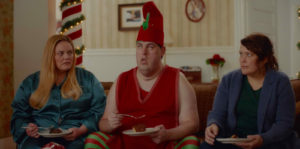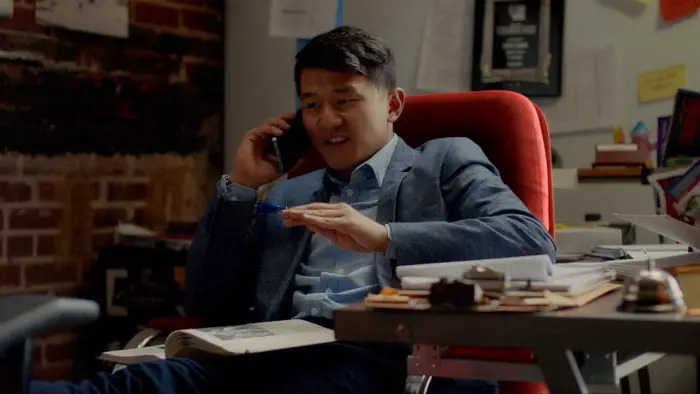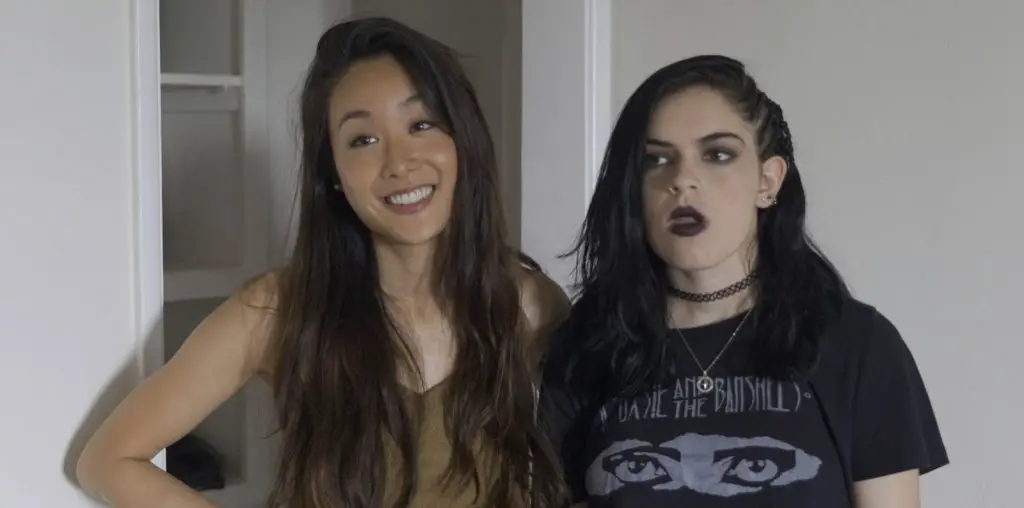
Hanging on to indie films for a second. There’s this great scene between Michelle and Andrea where they’re talking about the entertainment industry, and it draws attention to the landscape of Hollywood. Obviously, with everything seemingly upended, the recent strikes, and other fundamental shifts in our collective perception — how do the two of you see indie film fitting into this new picture? And, as a bigger question, what does independent film mean to you?
Arlen: I think, working backward, there were a lot of times while we were making this movie that one or both of us would have questions for each other. Specifically about the project as a whole and about whether we should change aspects of the film. Is it going to be more appealing to people if we do this, or is it going to be more sellable if we do this? You have those conversations on any project because it’s part of human nature.
The thing Kevin and I kept coming back to was that whenever one of us would start to go down that road, the other would be like, “There isn’t anyone to answer to when you’re making an indie film.”
We had the keys, and we could do what we wanted. We kept coming back to say, “Well, look, if we’re lucky and this is a massive hit, then guess what — on our next project, we’ll probably have more people to answer to.” This was one of our only chances to have things how we wanted them. Take it or leave it.
At least we can look back and be proud of that perspective. How to Ruin the Holidays was what we wanted to make, and made how we wanted. We didn’t change our vision because we didn’t have to. And that is the thing about indie films that’s the best. There’s no one over your shoulder forcing you to change.
Kevin and I could make our own artistic choices. If we’re lucky, then what you “win” is a bunch of people telling you what to change, which kind of doesn’t feel like a win. But that’s how it works.
Kevin: On some level, commerce and art are both right. Even if they don’t like each other. Because commerce wants to make the safe choice, to make the smart choice that’s going to make sense financially.
Art doesn’t want to do that. Art wants to be new, and it wants to express itself. It doesn’t want to be beholden to commercial guidelines. So the job of these projects is to try to maintain a balance between those opposing needs.
The beautiful thing about being an indie, kind of spring-boarding off of what Arlen said, is that you can do whatever you want. We just did screenings in Toronto, and I had a couple of colleagues come up and say that they’d never seen a film like ours before. Now, say what you want about it — whether you loved it or you hated it, at least it seems to be something people haven’t seen.
That reaction is only possible on an indie level because, at a certain amount of financial investment, risks can’t be taken on a larger scale. So in this new landscape, as much as it feels like the indie might be getting choked out, I think that it’s actually a new opportunity for it to emerge in a different way.
To be a fresh voice that the mainstream can’t articulate.

“We didn’t change our vision because we didn’t have to. And that is the thing about indie films that’s the best.”
On voice, How to Ruin the Holidays is a film that is so unapologetically itself. Full stop. Kevin, as you said, whether anyone loves or hates it — at least it knows what it is. That’s a prevailing theme here, never apologize for yourself, and it’s one that is deeply resonant across the board. What was it like tapping into that particular sentiment?
Kevin: I had a thought recently, and I think it’s true, that this industry can be inherently humiliating. If you can’t come to terms with that, then it’s never going to work out.
If you can’t somehow get a degree of comfort with the fact that you’re exposing yourself so intimately and that inevitably there will be people that say, “You suck.” Then your life is going to be so rough. Arlen and I have been doing this for a long time, and at some point, you just have to accept the moments of anxiety and fear.
Because the moments of connection that you get out of it make that “pain” worth it. We’ve had people come up to us after screenings and say, “You know, this film reminded me of my family because of my brother. Or reminded me of this or that.”
People still have tears in their eyes and wound up laughing anyway. They want to come up and tell us about it, and that makes it worthwhile. It’s such a privilege.
Arlen: This is an absolutely brutal industry. There’s no sugarcoating it, and Kevin and I are incredibly lucky in so many ways. All you can do is your best and make the things you believe in. That’s what we tried to do with this one.
It’s out there, and there’ll be people who tell us we’re horrible and it sucks — and we shouldn’t ever make another one. But then there will be those people who love it, and that’s just how it is. That’s art.
Kevin: Colin Mochrie was such a mentor figure on this project because I went to him and said, “Man, you know, I’m feeling a little bit of pressure to commercialize and mainstream this concept. But it goes against what I feel is so good about it, you know?” And he told me, “Kev, you’ve got the rest of your career to cave to other people’s whims. Do what you think is good.”
Colin gave us a ton of courage to do that.
As a quick question before I get you guys out of here. Looking again at the production of How to Ruin the Holidays — what were some of the challenges you faced during the production? And what were some of the, let’s call them, Christmas miracles that happened on set that helped things work out?
Kevin: The COVID-19 pandemic was one, and then as far as the release — the actors strike. We didn’t have a huge marketing budget, but what we did have is this great cast. Until recently, we haven’t been able to leverage that cast towards anything because they were prohibited from promoting.
Another one was that a factory was being demolished near our set one day, and there was a gas leak that had us sheltering in place for a big chunk of time. The list of bumps in the road goes on and on and on.
Arlen: The good stuff was the day-to-day. When you finished the scene, the performances were great, and everyone was laughing.
Kevin: One last year would be when Buffalo 8 offered us distribution, including a limited theatrical release, which is not what we expected. That was definitely a moment for celebration.
Arlen: We ended up having a pickup day with Henry, which we were not originally going to have. At the time, we had to shift schedules around, and we were worried about what that meant.
In the end, he’s so funny in the movie, and he is such a clear standout. He does so much with such a small amount of screen time. I don’t think we would have the time to play if we hadn’t had to shift schedules.
Kevin: This is such an indie film cliché, but we were, trying to do a big lift on a limited budget. Our costume department was one person, and she needed support. The problem was we didn’t have the money.
But because we’d written an article about it in our neighborhood paper, one of our neighbors came to us and helped out. They used to work costume department for years, had retired, but offered a set of hands. And I was like, “Get down here!”
We doubled the size of our costume team because a friendly person read about us in the paper. That was our big wish, “upon a star moment.”
How to Ruin the Holidays is playing in select theaters in Los Angeles and Atlanta throughout the holidays and will be on demand in December.

